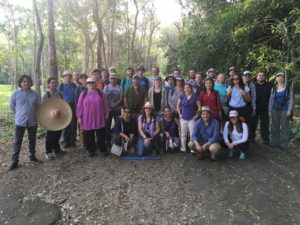Expediting and Exploring Interdisciplinary Practice Worldwide
Above: Professor Knowlton tracking birds using radio-telemetry in an oil palm plantation in Brazil.
Jessie Knowlton, assistant professor of biology, recently collaborated on the article “Barriers and Solutions to Conducting Large International, Interdisciplinary Research Projects” published in the journal Environmental Management.
The paper focuses on global environmental problems such as climate change, identifying how they are no longer bound by national borders or scientific disciplines, therefore requiring international, interdisciplinary teamwork.

Knowlton explained that her work was motivated by her experiences as a member of a large scale, interdisciplinary, international team funded by a National Science Foundation Partnerships for Internal Research and Education (NSF-PIRE) grant. This team was comprised of over 50 scientists from six different countries, with backgrounds ranging from natural to social and engineering sciences.
The research itself focused on the socio-ecological sustainability of bioenergy development across the Americas. They administered a structured questionnaire to team members about challenges they faced while working together across disciplines and outside of their home countries in Argentina, Brazil, and Mexico. Their findings indicated five major types of barriers to conducting interdisciplinary, international research: integration, language, fieldwork logistics, personnel and relationships, and time commitment. Knowlton and her coauthors wish to use their project experiences to help other interdisciplinary, international research teams anticipate challenges and develop effective solutions to minimize the negative impacts of barriers to their research.
Though the experience proved challenging at times, being part of such a large, diverse, and geographically distributed team, Knowlton thoroughly enjoyed her time spent as a member. “I loved being part of this research group. I learned a great deal about how other disciplines think about and approach environmental sustainability problems, and I was also lucky enough to spend significant time in each of the six study countries – Argentina, Brazil, Canada, Mexico, USA, and Uruguay – and learned a lot about the cultures and priorities of those countries” said Knowlton.
A new addition to Wheaton’s Biology department, Knowlton plans to continue to use her network of connections from the PIRE project across Latin America to conduct interdisciplinary and ecological research on environmental problems. She will also be taking a Wheaton student along to her Mexican field site to continue researching the impacts of oil palm plantations on regional biodiversity.
The article “Barriers and Solutions to Conducting Large International, Interdisciplinary Research Projects” can be found in the September 2017 issue of the journal Environmental Management.
